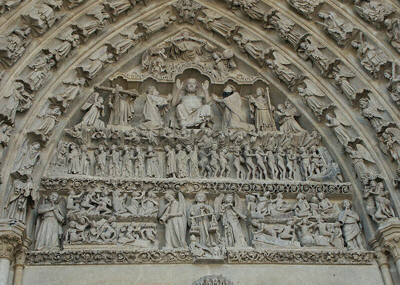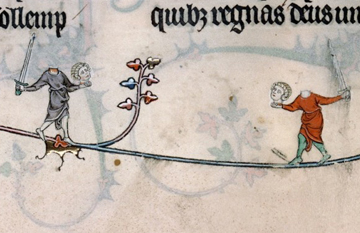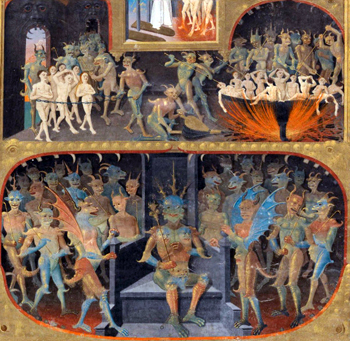Faith under Attack
 |
 |
 |
 |
 |
 |
 |
The Dogma of Hell – Part I
Hell of the Damned, the Place
Where Souls Remain Forever
After studying Purgatory, (here, here, here, here &
here) it seemed logical to address Hell. This dogma has also been much forgotten and even denied, especially as being a place where the souls of the damned are for all eternity.
The main source for the present series is Fr. François Xavier Schouppe’s outstanding book entitled Hell: The Dogma of Hell Illustrated by Facts Taken from Profane and Sacred History. (1) This series will summarize this work, written over 100 years ago, and also present thoughts and opinions of other authors.
The dogma that Hell exists is, as Fr. Schouppe notes, “the most terrible truth of our faith. We are as sure of Hell as we are the existence of God. ” (2) Our Lord Himself proclaims it as many as 50 times in the Gospel.
 Revelation is supported by reason, and the existence of Hell is in harmony with Natural Law, which is the expression of immutable Divine Justice. Indeed, in history no people existed that did not have a system of punishment for those who do not follow the ordinary laws. A variety of punishments ending with the death penalty is the normal rule of any society.
Revelation is supported by reason, and the existence of Hell is in harmony with Natural Law, which is the expression of immutable Divine Justice. Indeed, in history no people existed that did not have a system of punishment for those who do not follow the ordinary laws. A variety of punishments ending with the death penalty is the normal rule of any society.
This penal reality that exists everywhere is nothing but a reflection of Divine Justice. It is not difficult to see that an eternal punishment - Hell - is one plate on the scales of Divine Law. The other plate is the eternal reward for those who are faithful. This is what reason tells us about Hell.
Some explicit notions of Hell have always been acknowledged by many peoples. Hell has never been denied by heretics, Jews and Mohammedans. Ironically, it was only the era of Enlightenment in the 18th century that separated reason and faith and created this enormous stupidity called Atheism. An atheist philosopher is as stupid as a scientist who would pretend that the light and heat that benefits the earth does not come from the sun. So, after that “enlightenment,” we have to bear with those moles who cannot see an inch in front of their noses and deny God as the cause of Creation and Natural Law. Atheists also deny Hell.
Sadly, in our days, in order to “adapt to the modern world,” Progressivism accepts the presuppositions of those atheists and also minimizes – if not rejects – the existence of Hell. Even high ranking ecclesiastics in the Catholic Church herself are doing so…
Foolish sophisms
Fr. Schouppe pictures some unhappy persons who persuaded themselves that Hell does not exist based upon self-interested internal sophisms. Their reasoning is as follows: Let us look briefly at each of these reasoning. “I do not believe in Hell,” some simply say. Will Hell exist any the less because you do not wish to believe in it? If you deny your own existence, do you cease to exist? (3)
Let us look briefly at each of these reasoning. “I do not believe in Hell,” some simply say. Will Hell exist any the less because you do not wish to believe in it? If you deny your own existence, do you cease to exist? (3)
“No one knows what future life is and Hell is just a ‘perhaps’” In fact, this argument is resolved by Revelation that speaks with no uncertainty about Hell. The truth of Hell is known by the infallible word of God. Only the most foolish of men would base themselves on a “perhaps” and thus expose himself to the punishment of everlasting fire.
As for the third argument, there are, indeed, damned souls who have returned to earth to reveal their everlasting chastisements as we will see at the last part of this article.
Holy Scriptures speaks of Hell
There are many references to the existence of Hell (4) in the Old Testament. Among others, the following:
• The wicked shall be turned into Hell, all the nations that forget God. (Ps 8:18)
• Therefore hath Hell enlarged its soul and opened its mouth without any bounds, and their strong ones and their people, and their high and glorious ones shall go down into it. (Is 5:14)
 • Let death come upon them and let them go down alive into Hell. For there is wickedness in their dwellings in the midst of them. (Ps 54:16)
• Let death come upon them and let them go down alive into Hell. For there is wickedness in their dwellings in the midst of them. (Ps 54:16)
• I shook the nation with the sound of his fall, when I brought him down to Hell with them that descend into the pit. (Ez 31:16)
• For they also shall go down with him to Hell to them that are slain by the sword: and the arm of every one shall sit down under his shadow in the midst of nations (Ez 31:17)
• Thou shall make them as an oven of fire in the time of thy anger: the Lord shall trouble them in his wrath and the fire shall devour them. (Ps 20:10)
In the New Testament we find these infallible words:
• If they hand scandalize thee, cut it off; it is better for thee to enter into life maimed than having two hands to go into Hell, into unquenchable fire: where the worm dies not and the fire is not extinguished. (Mk 9:42f)
• And thou, Capharnaum, which art exalted unto Heaven, thou shalt be thrust down to Hell. (Lk 10:15)
• God spared not the angels that sinned, but delivered them, drawn down by infernal ropes to the lower Hell into torments to be reserved unto judgment. (2 Pet 2:4)
• Then he shall say to them also that shall be on his left hand: Depart from me, you cursed, into everlasting fire which was prepared for the devil and his angels. (Mt 25:41)
• There came down fire from God out of Heaven and devoured them, and the devil, who seduced them, was cast into a pool of fire and brimstone, where both the beast and the false prophet shall be tormented day and night, forever. (Apoc 20:9-10)
• They shall go into everlasting punishment. (Mt 25:46)
De fide teaching of the Church
In his Fundamentals of Christian Dogma, theologian Ludwig Ott presents these two de fide teachings on the topic of reprobation and Hell.
1. The souls of those who die in the condition of personal grievous sin enter Hell (5) – The Athanasian Creed declares: “Those who have done evil will go into eternal fire” (Denzinger 40).
Benedict XII declared in the Constitution Benedictus Deus: “According to God’s general ordinance, the souls of those who die in a personal grievous sin descend immediately into Hell, where they will be tormented by the pains of Hell” (Denz. 531).
The Church Fathers unanimously attest to the reality of Hell. For example, St. Ignatius of Antioch states that those who corrupt the faith in God by erroneous teaching “will go into the unquenchable fire – as will those who listen to them.” St. Justin bases the punishment of Hell on the idea of Divine Justice, which demands punishment for those who transgress the law of God. (6)
2. The punishment of Hell lasts for all eternity - Affirming the eternal nature of Hell, spoken of often in the Holy Writ, (7) the Fourth Lateran Council (1215) declared: “Those [the rejected] will receive a perpetual punishment with the devil.” (Denz. 429)
An impressive manifestation of Hell
In His mercy, God aids our faith on the truth of Hell by manifestations of a sensible nature. These are more numerous than is generally thought and are supported by sufficient proofs. Here is one impressive example, judicially proved in the process of canonization of St. Francis of Jerome (1642-1716) and attested under oath by a large number of eye-witnesses.
St. Francis was preaching in Naples on Hell and the terrible chastisements that await obstinate sinners. A brazen prostitute of the area named Catherine came to disrupt his sermon with jests and shouts.
 The Saint cried out to her, “Beware, my daughter, of resisting grace. Before eight days have passed, God will punish you.”
The Saint cried out to her, “Beware, my daughter, of resisting grace. Before eight days have passed, God will punish you.”
Instead of heeding his words, the woman only mocked him more vehemently.
After eight days, the Saint was again in that area and was told that Catherine had died suddenly that very day. He said, “Well, let her tell us now what she has gained by laughing at Hell.”
Followed by a crowd, he went to the death chamber, uncovered the face of the corpse, and said loudly, “Catherine, tell us where you are now.”
The dead woman lifted her head and opened her eyes. Her features took on an expression of despair and, in a mournful voice, she said, “In Hell. I am in Hell.” Then she fell back again in the condition of a corpse.
Fr. Schouppe records the words of one witness, who said, “I never could convey the impression this incident produced on me and the bystanders, which I still feel every time I pass that house and look at that window. I still hear the pitiful cry resounding: ‘In hell. I am in hell.’” (8)
This is just one example of manifestations of souls who have returned to earth to admit they are suffering eternal punishment.
Continued

The main source for the present series is Fr. François Xavier Schouppe’s outstanding book entitled Hell: The Dogma of Hell Illustrated by Facts Taken from Profane and Sacred History. (1) This series will summarize this work, written over 100 years ago, and also present thoughts and opinions of other authors.
The dogma that Hell exists is, as Fr. Schouppe notes, “the most terrible truth of our faith. We are as sure of Hell as we are the existence of God. ” (2) Our Lord Himself proclaims it as many as 50 times in the Gospel.

Our Lord Jesus Christ presiding over the Last Judgment
This penal reality that exists everywhere is nothing but a reflection of Divine Justice. It is not difficult to see that an eternal punishment - Hell - is one plate on the scales of Divine Law. The other plate is the eternal reward for those who are faithful. This is what reason tells us about Hell.
Some explicit notions of Hell have always been acknowledged by many peoples. Hell has never been denied by heretics, Jews and Mohammedans. Ironically, it was only the era of Enlightenment in the 18th century that separated reason and faith and created this enormous stupidity called Atheism. An atheist philosopher is as stupid as a scientist who would pretend that the light and heat that benefits the earth does not come from the sun. So, after that “enlightenment,” we have to bear with those moles who cannot see an inch in front of their noses and deny God as the cause of Creation and Natural Law. Atheists also deny Hell.
Sadly, in our days, in order to “adapt to the modern world,” Progressivism accepts the presuppositions of those atheists and also minimizes – if not rejects – the existence of Hell. Even high ranking ecclesiastics in the Catholic Church herself are doing so…
Foolish sophisms
Fr. Schouppe pictures some unhappy persons who persuaded themselves that Hell does not exist based upon self-interested internal sophisms. Their reasoning is as follows:
- I do not believe in Hell;
- Those who believe this dogma have no proof of its existence since the future life after death is an insoluble problem, an invincible “perhaps”;
- No one has returned from beyond the grave to testify there is a Hell.

Those who deny Hell are mindless fools, walking on a dangerous tightrope
“No one knows what future life is and Hell is just a ‘perhaps’” In fact, this argument is resolved by Revelation that speaks with no uncertainty about Hell. The truth of Hell is known by the infallible word of God. Only the most foolish of men would base themselves on a “perhaps” and thus expose himself to the punishment of everlasting fire.
As for the third argument, there are, indeed, damned souls who have returned to earth to reveal their everlasting chastisements as we will see at the last part of this article.
Holy Scriptures speaks of Hell
There are many references to the existence of Hell (4) in the Old Testament. Among others, the following:
• The wicked shall be turned into Hell, all the nations that forget God. (Ps 8:18)
• Therefore hath Hell enlarged its soul and opened its mouth without any bounds, and their strong ones and their people, and their high and glorious ones shall go down into it. (Is 5:14)

Scriptures speak often of a place of eternal fire where Devils and the damned souls stay
• I shook the nation with the sound of his fall, when I brought him down to Hell with them that descend into the pit. (Ez 31:16)
• For they also shall go down with him to Hell to them that are slain by the sword: and the arm of every one shall sit down under his shadow in the midst of nations (Ez 31:17)
• Thou shall make them as an oven of fire in the time of thy anger: the Lord shall trouble them in his wrath and the fire shall devour them. (Ps 20:10)
In the New Testament we find these infallible words:
• If they hand scandalize thee, cut it off; it is better for thee to enter into life maimed than having two hands to go into Hell, into unquenchable fire: where the worm dies not and the fire is not extinguished. (Mk 9:42f)
• And thou, Capharnaum, which art exalted unto Heaven, thou shalt be thrust down to Hell. (Lk 10:15)
• God spared not the angels that sinned, but delivered them, drawn down by infernal ropes to the lower Hell into torments to be reserved unto judgment. (2 Pet 2:4)
• Then he shall say to them also that shall be on his left hand: Depart from me, you cursed, into everlasting fire which was prepared for the devil and his angels. (Mt 25:41)
• There came down fire from God out of Heaven and devoured them, and the devil, who seduced them, was cast into a pool of fire and brimstone, where both the beast and the false prophet shall be tormented day and night, forever. (Apoc 20:9-10)
• They shall go into everlasting punishment. (Mt 25:46)
De fide teaching of the Church
In his Fundamentals of Christian Dogma, theologian Ludwig Ott presents these two de fide teachings on the topic of reprobation and Hell.
1. The souls of those who die in the condition of personal grievous sin enter Hell (5) – The Athanasian Creed declares: “Those who have done evil will go into eternal fire” (Denzinger 40).
Benedict XII declared in the Constitution Benedictus Deus: “According to God’s general ordinance, the souls of those who die in a personal grievous sin descend immediately into Hell, where they will be tormented by the pains of Hell” (Denz. 531).
The Church Fathers unanimously attest to the reality of Hell. For example, St. Ignatius of Antioch states that those who corrupt the faith in God by erroneous teaching “will go into the unquenchable fire – as will those who listen to them.” St. Justin bases the punishment of Hell on the idea of Divine Justice, which demands punishment for those who transgress the law of God. (6)
2. The punishment of Hell lasts for all eternity - Affirming the eternal nature of Hell, spoken of often in the Holy Writ, (7) the Fourth Lateran Council (1215) declared: “Those [the rejected] will receive a perpetual punishment with the devil.” (Denz. 429)
An impressive manifestation of Hell
In His mercy, God aids our faith on the truth of Hell by manifestations of a sensible nature. These are more numerous than is generally thought and are supported by sufficient proofs. Here is one impressive example, judicially proved in the process of canonization of St. Francis of Jerome (1642-1716) and attested under oath by a large number of eye-witnesses.
St. Francis was preaching in Naples on Hell and the terrible chastisements that await obstinate sinners. A brazen prostitute of the area named Catherine came to disrupt his sermon with jests and shouts.

St. Francis of Jerome preaching on the Last Things
Instead of heeding his words, the woman only mocked him more vehemently.
After eight days, the Saint was again in that area and was told that Catherine had died suddenly that very day. He said, “Well, let her tell us now what she has gained by laughing at Hell.”
Followed by a crowd, he went to the death chamber, uncovered the face of the corpse, and said loudly, “Catherine, tell us where you are now.”
The dead woman lifted her head and opened her eyes. Her features took on an expression of despair and, in a mournful voice, she said, “In Hell. I am in Hell.” Then she fell back again in the condition of a corpse.
Fr. Schouppe records the words of one witness, who said, “I never could convey the impression this incident produced on me and the bystanders, which I still feel every time I pass that house and look at that window. I still hear the pitiful cry resounding: ‘In hell. I am in hell.’” (8)
This is just one example of manifestations of souls who have returned to earth to admit they are suffering eternal punishment.
Continued
- Francois Xavier Schouppe, The Dogma of Hell, Illustrated by Facts Taken from Profane and Sacred History, Rockford, IL: TAN, 1989
- Ibid., p. 1.
- Ibid., p. 2.
- Other references in the Old Testament: Ez 31:18, Ez 32:21, 27, Prov 7:27, Prov 9:18, Prov 15:24, Is 29:10, Is 24:21f., Jude 6, Ecclus 21:10-12, Ps 87:5,7, Ps 37:12f, Wis 4:20, Job 22:17-20, Dan 12:2, Wis 5:1-3, Wis 5:4f, Wis 5:79, Is 33:14, Deut 32:39.
Other references in the New Testament: Mk 9:46-47., Mt. 7:13, Mt. 10:23, Mt 7:13, 2 Pet 2:9, Mt. 18:8, Lk 13:27, 2 Thess 1:9, Mt 25:30, Mt 3:12, Mk 9:44, Lk 16:23, 2 Pet 2:9, Eph 5:6, Rom 1:28-32, Apoc 22:15, Apoc 21:8 - Ludwig Ott, Fundamentals of Christian Dogma, St. Louis: Herder, 1969,pp. 479-480.
- Ibid., p. 480
- Dan 12:2; Wis 4:19; Judith 16:21, 7; Mt 18:8, 25:41, 46, 3:12; Mk 9:43; Mk 9:45f, 2 Thes 1:9; Apoc 19:3, 20:10.
- F.X. Schouppe, The Dogma of Hell, pp. 3-4.

Posted March 24, 2014
______________________
______________________





